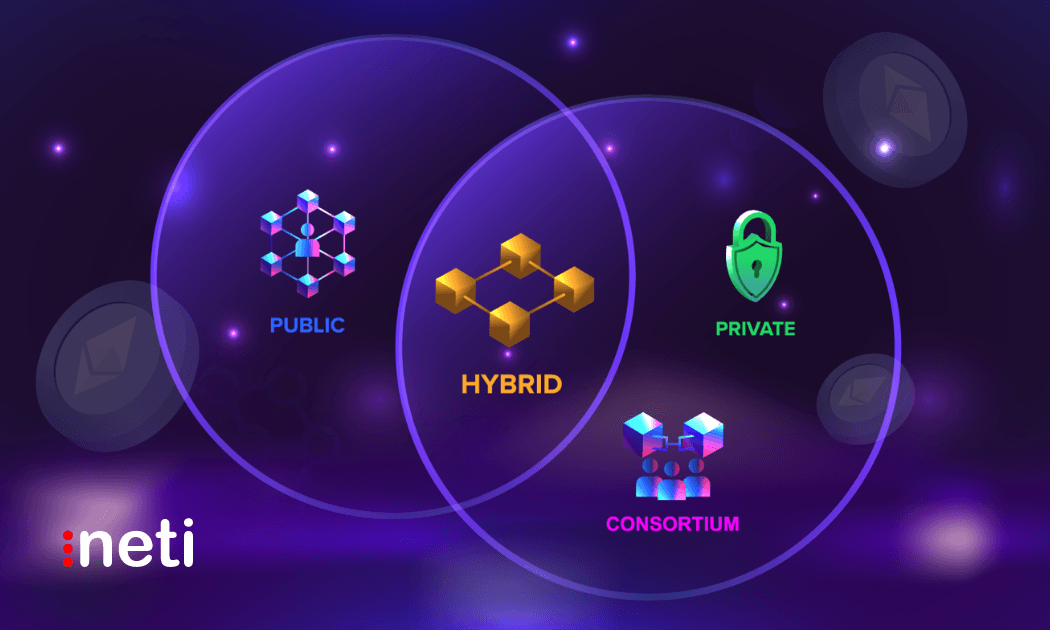Public Blockchain
Permissionless fully decentralized blockchain that can be accessed by anyone. Nature of this kind of blockchain has no single owner or administrator, instead, they are maintained by a network of participants, referred to as nodes, who all have access to the blockchain. All participants must agree to the same protocol, or set of rules, before data can be added to the blockchain. Public blockchains are transparent, everyone can view the activity of the network. This allows for greater accountability and trust in the system.
Private Blockchain
Opposition to public blockchain is private. Managed and monitored by a single organization, fully permissioned. This kind of blockchain is visible to the public and requires participants to have permission to join. Private blockchains offer many benefits, including enhanced security, improved scalability, and reduced transaction costs. One of the most important is performance and scalability - they can handle large volumes of transactions without the need to increase network size. This allows the use of private blockchain in implementing complex business processes and is the reason why private blockchains have many applications in enterprise business solutions.
Consortium Blockchain
Consortium blockchains are permissioned blockchains controlled by multiple entities - usually businesses. It offers a number of advantages over public blockchains, including improved scalability, privacy, and control. Usage of consortium blockchains is growing as businesses across industries recognize the potential of this technology to facilitate collaboration, secure data, and streamline processes. For example, consortium blockchains are being used in the financial services, healthcare, and energy sectors.
Hybrid Blockchain
The best definition of hybrid blockchain is a combination of the good features of public blockchain and private blockchain. The hybrid blockchain architecture is divided between two areas such as access control but still allows the use of public features such as integrity, transparency, and security giving the possibility of full control as well as freedom at the same time.
Still Private
Hybrid blockchains combine the best of both worlds by allowing users to access certain parts of the blockchain while keeping other parts private. This type of blockchain is often used in scenarios where some data needs to be shared publicly and other data needs to be kept private. For example, a hybrid blockchain could be used to store medical records, allowing the doctor to access the data while keeping the patient’s personal information private. Use of hybrid blockchains can help to ensure data security while still allowing for the public to view certain aspects of the blockchain. This can help to increase transparency and trust, while also providing a higher level of security for sensitive data.
Best Features Put Together
Security
One of the most important benefits of hybrid blockchains is increased security. By combining a private blockchain's security with a public blockchain's transparency, organizations can better secure their data and transactions. Private blockchains are more secure since they are not accessible to the public, while public blockchains provide more transparency and accountability. By combining the two, organizations are able to better protect their data while also providing a higher level of trust and accountability.
Scalability
Another major benefit of hybrid blockchains is scalability. Public blockchains are excellent for large-scale transactions but can become slow or congested when there is a lot of activity. Private blockchains, on the other hand, are faster and more efficient but are not as suitable for large-scale applications. By combining the two, organizations can ensure that their transactions remain secure and efficient no matter how much activity is taking place.
Low Fee
Hybrid blockchain requires a smaller number of nodes to verify transactions, which allows for a significant reduction in costs.
Protecting from 51% Attack
Hybrid blockchain is immune to attacks in which adversaries control most of the network's mining or staking power, ensuring enhanced security.
Flexibility
Finally, hybrid blockchains allow for increased flexibility. By combining the two blockchains, organizations are able to customize the blockchain to their specific needs. For example, if an organization needs to scale quickly, they can adjust the rules of the private blockchain to increase its throughput. Conversely, if an organization wants to focus more on security, they can adjust the rules of the public blockchain to better protect their data. This level of flexibility is not possible with a single type of blockchain, making hybrid blockchains an attractive option for many businesses.
Use Cases
Supply Chain Management
One of the main benefits of using a hybrid blockchain in supply chain management is that it allows for the secure and transparent sharing of information with multiple parties. This can be especially useful for businesses that need to share data with customers, suppliers, and other stakeholders. By using a hybrid blockchain, businesses can ensure that all parties have access to the same information and can verify that it is up to date, while also preventing any unauthorized changes to the data.
IBM Food Trust
One of the biggest examples of hybrid blockchain is IBM Food Trust. It was developed to address the food industry’s growing need for traceability and transparency. Providing an open and secure platform allows businesses to track food from farm to fork, establishing trust and accuracy in food production. By leveraging the features of hybrid blockchain, IBM Food Trust provides an immutable record of transactions throughout the supply chain, enabling stakeholders to securely share information about food production, distribution, and consumption.
Finance and Payments
Hybrid blockchains can facilitate faster, more secure, and cost-effective cross-border transactions and remittances, reducing reliance on intermediaries and enhancing financial inclusion
Ripple
Ripple is a fintech company that utilizes a hybrid blockchain solution called the XRP Ledger. It combines the benefits of both public and private blockchains to facilitate fast and low-cost cross-border payments. The XRP Ledger is designed for financial institutions and payment service providers, offering them the ability to settle transactions efficiently and securely.
Mastercard
Mastercard, a global payment technology company, has been exploring the use of hybrid blockchain in its payment systems. They have developed blockchain-based solutions that combine the benefits of public blockchains, such as transparency and security, with the privacy and scalability of private blockchains. Mastercard aims to improve payment processing speed, reduce fraud, and enhance overall transaction security.
Energy and Utilities
Hybrid blockchains can enable peer-to-peer energy trading, streamline energy grid management, and ensure efficient tracking and verification of renewable energy sources. The adoption of blockchain technology in the energy market is projected to surge from $200 million in 2018 to approximately $18 billion by 2025.
Power Ledger
Power Ledger is a company that utilizes hybrid blockchain technology for peer-to-peer energy trading and renewable energy certificate tracking. Their platform allows individuals and businesses to buy and sell energy directly, promoting decentralized and sustainable energy transactions.
Electron
Electron is a company that leverages hybrid blockchain technology to facilitate data sharing and collaboration in the energy sector. Their platform enables secure and efficient communication among energy market participants, supporting initiatives like grid optimization and demand response.
Real Estate
Hybrid blockchain in real estate enables secure and transparent property transactions. It combines private and public blockchains to streamline processes, automate transactions through smart contracts, and enhance security by immutably recording ownership information. This technology improves efficiency, reduces paperwork, and fosters trust among stakeholders.
Propy
Propy is a global real estate marketplace that utilizes hybrid blockchain technology to facilitate property transactions. Their platform enables secure and transparent recording of property ownership records and facilitates cross-border property transactions.
ChromaWay
ChromaWay offers a hybrid blockchain platform called Postchain, which can be used for real estate applications. Their solution focuses on streamlining property transactions, reducing fraud, and enhancing transparency and efficiency in the real estate market.
In conclusion, the blockchain landscape offers diverse solutions, each with unique strengths and applications. The public, private, consortium, and hybrid blockchains all cater to different needs and use cases, allowing businesses to choose the most suitable solution for their requirements. Hybrid blockchains, in particular, have emerged as a powerful alternative, connecting the advantages of both public and private blockchains to ensure security, scalability, and transparency while maintaining control and privacy. As organizations across industries continue to recognize the transformative potential of blockchain technology, it is crucial to understand and evaluate the different options available to implement the most effective and efficient solution for each specific use case. With the rapid pace of innovation and adoption, the future of blockchain technology promises to bring about significant improvements in efficiency, collaboration, and trust across a wide range of sectors.


